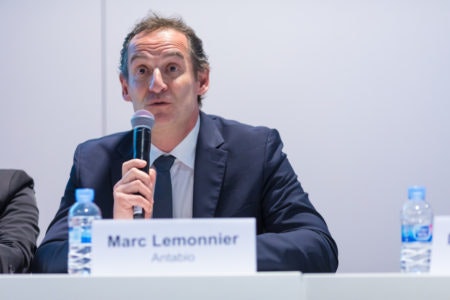Biotechs successfully navigate alternative paths to financing

The CEO of the biopharma company Antabio, Marc Lemonnier found himself in a perfect position on the panel for a session on alternative investing at BIO-Europe Spring® in Barcelona.
"Where I am sitting nicely summarizes the history of my company. In the past we received startup financing from crowdfunding, and then funding from Wellcome Trust," he said turning to his left. Then turning to the other side he faced Carolyn Green who leads the new Strategic Investments fund for Pfizer Worldwide R&D.
 Marc Lemonnier, Antabio
Marc Lemonnier, Antabio"And hopefully the future of my company is here with someone like Carolyn at Pfizer," he said.
[caption id="attachment_9862" align="alignleft" width="450"] Carolyn Green, Pfizer
Carolyn Green, Pfizer
Lemonnier's experience financing Antabio over the past eight years was a springboard to dive into the discussion of how biotechs can navigate the expanding alternatives to traditional venture capital equity funding.
"I am a happy CEO, and our company was the first success in crowdfunding for biotech," he said. "In 2010 we were very far below the radar of the VC funds, yet with just EUR 100,000 I knew we could take two compounds to a patent, and then have something attractive for further funding."
By good fortune Antabio is based in Toulouse, France where a crowdfunding platform called WiSEED had been launched in 2008. In two months over 200 private investors stepped up to raise EUR 300,000 for the company.
Now able to show in vitro proofs for antibacterial compounds targeting severe infections, Lemonnier continued his journey into alternate financing, winning EUR 500,000 from an French angel investor. Now able to deliver proofs and data, he applied to the Wellcome Trust for project funding, winning in 2014 a EUR 4.7 million Seeding Drug Discovery Award.
"With this momentum, the angel investor decided to buy out all the crowdfunding investors, who all got out with a profit," he said, and the crowning moment that made him a happy CEO was when in 2015 Wellcome granted a further award bringing its investment in Antabio to EUR 9 million.
"Crowdfunding seemed opportunistic at that time, but it did work. And the Wellcome Trust has been wonderful because it is not just the money but the network," he said.
According to fellow panelist Richard Seabrook, who is a Senior Advisor at Wellcome, "In addition to project-based finance, we are able to give access to the Wellcome network of experts with experts from the clinic, from industry, from venture capital, from academia and key opinion leaders. We access this network to determine what a data package needs to look like for follow-on funding, or one that will attract the attention of a potential licensee," he said.
"For most smaller companies it is difficult to get the attention of these people so they are part of what we are able to bring to a project, people who can bring their experience to bear to be sure the company is not going to make a mistake someone else has already made, and so that we can get to the inflection for value as quickly and cheaply as we can," said Seabrook.
"We are agnostic as to who the other investors in a company may be, including crowdfunding as with Antabio, and now a couple other companies," he said, adding that, "Crowdfunding is at early stage of development, and I don't believe that as a sector we have fully worked out where it fits, though I do believe it has an important role to play."
Daniel Oliver Uriel has no doubt about the role of crowdfunding in the life sciences. It is the future, he said.
The CEO at Capital Cell, the first online European equity crowdfunding platform, the company in four years has completed 14 life science financings gathering 700 investors. Based in Barcelona, Uriel is now setting up a platform in London.
"The internet is bringing a lot of changes to other industries, and this is what the internet is doing to equity investing," he said. "It is well suited to early stage companies that seek up from EUR 1 million to EUR 2 million on terms that the company wants to set, though there are tradeoffs. You work harder, but the funds come with more flexible conditions as you will not have preferred liquidations or give board of director seats.
"It can also fit into any other financing operation," he said. "We have done rounds with a larger VC. If we are co-investing with a foundation and are required to include specific criteria, then we do that. We can do a top-up operation. Every operation can be tailor-made and it is 100 percent compatible with anything else.
"Is it really possible that people investing an average of EUR 3,000 will become a major force in life sciences financing? Yes," said Uriel. "Perhaps it can replace the small alternative stock markets. Why not? Effectively the AIM is already accessible through crowdfunding." [NOTE: Alternative Investment Market of the London Stock Exchange]
Uriel added, "It is not a matter of whether this will happen. It is only a question of when and how, though I don't think anyone has an idea of what that will look like in 10 years."